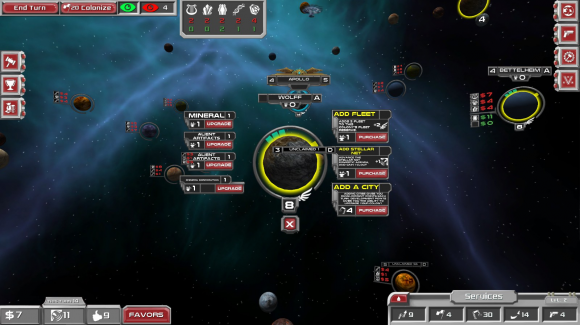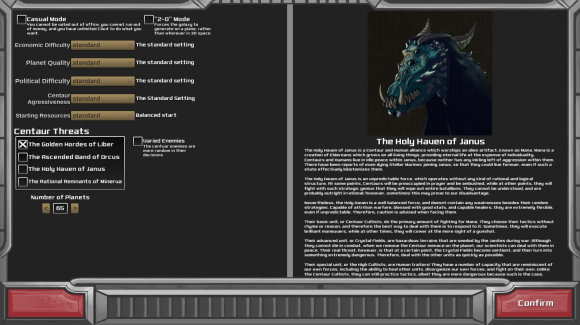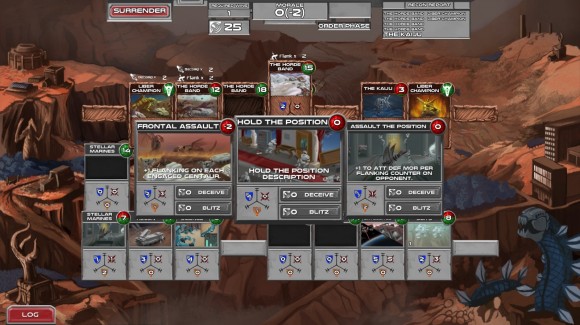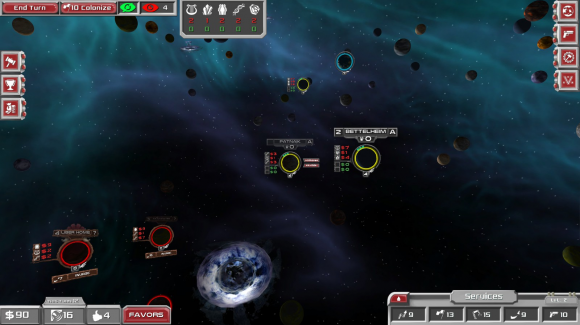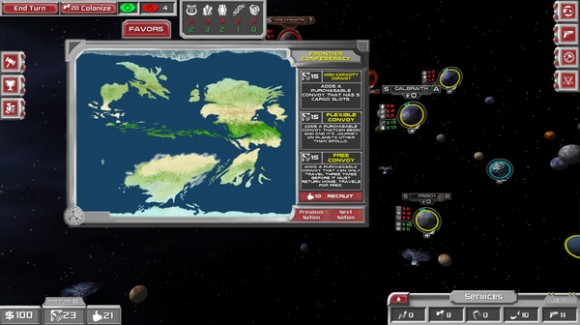It is a fundamental law of nature that when you add space before anything it makes it cool. Space bounty hunter? The coolest. Space cowboy? Oh yeah. Space janitor? C’mon, you know you are tempted to sign up to scrub the zero-g toilets. If you’ve paid any attention to the site and the podcast, I tend to be the kind of person who enjoys numbers and simulations. So when I heard trade simulation in space, my interest was piqued. Apollo 4x does accomplish what it sets out to do, but it might have a high barrier of entry for all but the most dedicated players.
Apollo 4X puts you in control of a trading empire centered on the titular world of Apollo. Upon starting the game, you will have to choose three starting planets. Along with Apollo these will serve as the foundation of your empire. The object of the game is to build an empire trading five separate resources between the colonies that you build on these planets. There are costs related to transportation, and building the infrastructure, and even launching a fleet. The costs of doing business are calculated into the game. This means that in order to make sure you are profitable, you must manage your trade strategy to be as efficient as possible.
There are a lot of variables to the game. First there is the infrastructure. In order to even be able to begin to think about trading, you need to build the infrastructures of the planets you choose to colonize. You need cities, to make sure there are people that would want commodities, and also plant corporations that will drive commerce in said planet. Players must be careful when placing said corporations. Different corporations require specific resources, and if you place them in the planets that have those resources then they won’t buy anything because they already have it. This means it is very important to pick your worlds and your corporations carefully.
Once you have created wealth from the commerce you stimulated, you must spend those funds. There are a lot of things you can do, and must do in order to ensure long term success and profitability. You must upgrade your fleets, your marketplace, etc… so that you can improve your capacity to expand your planets, your military might, the number of convoys you will have so that you can trade more, and trade with further planets in the same turn.
Every turn, you will receive requests from the people of your diverse planets. These can usually be fulfilled by paying resources into their pool. For example, they might be having issues with crime, and so request that you help them out. This will cost military points. In return you will gain approval. This approval is a separate currency that you use to get different factions to align with you, which can give you extra perks that offer a great deal of variety. They can be anything from an extra 30 units of currency to use every turn to the ability to traverse worm holes to go to further planets.
Managing your influence and alliances is vital for the game to progress. You simply need to have the perks if you want to have long term success. Each planet has a rating based on a letter. “A” planets are cheap and profitable to add to your empire, with every improvement costing one unit. “B” class planets cost 2 units per upgrade, “C” planets cost 4, and so on. This means that you will want to expand outside of your immediate sphere of influence to look for greener pastures fairly early. It is not advisable to even look at a planet that is less than “C” class unless they have a trade-able resource you are in dire need of, because the cost to colonize will be simply prohibitive.
While Apollo 4X does not have an enemy AI competing against you in a symmetrical fashion, as you would expect in games like Civilization or the recent Endless Legend, you are not alone in the universe. There is a race of Centaurs (or two, or three, or four, you can customize it in the options) that will be expanding in the fringes of the galaxy, and that you will eventually come into conflict with. The Centaurs are not really symmetrical opponents, they are mostly concerned with expansion. After a certain number of turns, they will expand to the planet closest to their own system. Because they are not concerned with building their infrastructure and don’t share your zeal for capitalism, they don’t care what kind of planet they have next to them. They will go for the class “F” planet that is right next to the class “A” just because it is closer. Don’t worry though, in a couple of turns they will be ready to move to that class “A” planet. Despite this seeming lack of strategy, the Centaur spread fast, and as they spread, they become stronger. Sometimes taking several victories before you can expel them off of a planet.
You will need to use some of your earnings to beef up your military. You purchase military points which in turn gives you capacity to add different troops. Combat is as deep as the rest of the game. It is essentially a card game. Different units have different stats, and abilities and therefore they have different uses. The game also tracks the morale of the troops, which depends on how the battle is doing. Depending on how entrenched the enemy is in a world, it will take several victories to kick them off of a world. The most worlds the Centaurs have, the stronger their home-worlds will be. There are different types of centaurs to choose from, and all of them have different strategies and weaknesses. You can choose to have several of them in play at once, though that can make the game quite difficult.
Apollo 4X also does away with some of the expected trappings of the 4X genre. It does not have exploration, the universe is open to you from the get go. This means you can easily see and plan where you want to expand. There are some worlds that will be mysteries to you when you begin the game and require a special perk to have any visibility on what is on them. Still, you can see that they are there from the beginning. There are also no delays when building thins, and purchasing resources, and while your resources are limited pretty much all the options will be available to you from the start. The object of the game is not to grow and race towards the end of the tech tree like most of the games in the genre, but rather to learn to use the available resources to maximize your efficiency, expand your empire, and successfully defend it from the hordes of the Centaurs. It is about getting better at the game itself with everything set forth, which is an interesting a refreshing change from the usual formula followed by this genre.
The game’s open nature is unfortunately its greatest weakness as well. The barrier of entry that Apollo 4X subjects its players to is brutal. Upon loading the game, the player is met with the whole game available from the start, and only a handful of tool tips to guide them through how the game is played. With a game this complex, they are nowhere near enough. The most likely outcome of the game as you play through it the first time is frustration and bewilderment as nothing seems to work. There is also not tutorial or any kind of introductory campaign to at least teach you the basic concepts. This hurts the accessibility of the game to an incredible degree. There are resources that the developer has put out to help people get in the game; an online manual, and a video tutorial. These are outside of the game, and the video tutorial is an hour long. This is not surprising, Apollo 4X is a game with a lot of moving parts, and the tutorial, while thorough, will likely be too much for most players. I love this kind of game, but were I not reviewing it, I don’t think I would have had the patience to sit through the video tutorial before giving up and moving on to the next game in my ever growing back log.
Apollo 4X could address a lot of its problems by starting small and growing in complexity. Think of Sid Meier’s Civilization series. You start with one town, which grows slowly and offers only a handful of technologies. The complexity grows as the game goes on and so does your empire. This kind of gradual introduction of complexity could do a bit to ameliorate the barriers that make the game so inaccessible, but in doing so I feel it would lose a lot of what makes Apollo 4x a unique experience. The only real way to address that is to have a robust tutorial in the game. I sincerely hope that DigiEnt is willing to put this in the game at a later date. In the meantime, Apollo 4X allows you to customize your game so that you can lower the difficulty, select which race of Centaurs you will be pitted against and how many, and there is even a mode that will make it so you can’t be voted out of office that I would recommend taking advantage of the first few games to make sure you can get used to the game.
That is, if you think you can stand to watch the one hour tutorial, and are willing to try to figure out the intricate system on your own. Apollo 4X is a deep game that definitely has enough variety in its mechanics to justify several runs. This is particularly true since the game gives a lot of control on the difficulty, enemies, and other variables in the game, which would make it possible to make it more difficult as you want. If you’re a fan of strategy games, especially the ones that have intricate economies, I would say give Apollo 4X a look. There is a lot to like and figure out here. However if you are looking for a game to get into the genre, this is not it. The lack of a tutorial hurts this game greatly. As it stands, Apollo 4X is likely only for the most patient and dedicated strategy fans.
This review was written on review code provided by the publisher.


